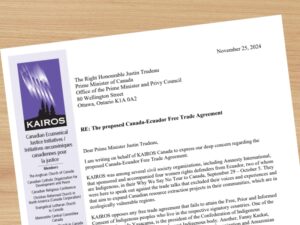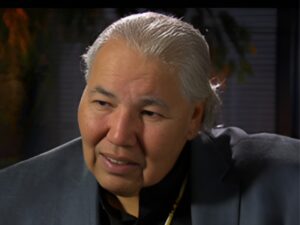The Rights of the Lubicon Must be Protected
“My grandmother and mother have a trap line of their own on which they go hunting and snaring but it is rare that they will bring any rabbits, moose, deer, prairie chickens, or even bears back home…With all these roads, semis, loud machinery, and cutting down of the forests, wildlife has been scared. This has affected our way of life, the Aboriginal Peoples of Lubicon Lake Nation. Simply because our tradition is to hunt and bring home moose meat, chicken, and rabbit for the family to feast on and to make moose and squirrel hide to sell and get money in exchange. But by not having the right to change this intrusion, it is rare that this will happen and our tradition will eventually fade away.”
Dawn Seeseequon, age 17, Lubicon Cree
Twenty years ago, on 26 March 1990, the United Nations Human Rights Committee (the Committee) ruled that Canada had violated the human rights of the Lubicon Cree, an Indigenous people who have lived for centuries in what is now the province of Alberta. The ruling was based on evidence that Canada had failed to recognize and protect Lubicon rights to their lands and that intensive oil and gas development had devastated the Lubicon economy and way of life.
The Committee ruled that “historical inequities… and certain more recent developments… threaten the way of life and culture of the Lubicon Lake Band and… so long as they continue” constitute a violation of the right to culture as protected by the International Covenant on Civil and Political Rights [CCPR/C/38/D/167/1984]
The Committee’s decision was a landmark step in recognizing the vital importance of lands and territories to Indigenous Peoples’ enjoyment of their collective and individual human rights. The decision was one of the important steps in the evolution of international human rights norms and standards which led to the adoption UN Declaration on the Rights of Indigenous Peoples in September 2007.
Twenty years later the Lubicon people continue to suffer from the same human rights violations that were condemned by the Committee in 1990.
- Despite assurances given to the Committee in 1990, Canada has yet to conclude a negotiated settlement with the Lubicon Cree. The last talks broke down in 2003 because of the arbitrary limitations the government imposed on both the compensation it would provide and the rights it was prepared to recognize.
- Intensive oil and gas development on Lubicon land has steadily accelerated. More than 2,600 oil and gas wells – or more than five for every Lubicon person – have already been drilled. Almost 70% of Lubicon territory has been leased for non-renewable resource extraction. This includes 1,395.6 km2 of tar sands development.
- The provincial government has never sought Lubicon consent for this development. While the province requires that the companies notify the Lubicon of their plans, the Lubicon have little recourse if they object to these plans. In October 2009, the Alberta Utilities Commission denied Lubicon standing when it approved a massive natural gas pipeline across their territory.
- The massive scale of development on Lubicon land has made hunting, trapping and other traditional sources of income and subsistence all but impossible. This has led to severe impoverishment, the proliferation of health problems associated with poverty, loss of culture and social strife.
- The federal government has treated its obligations to the Lubicon as benefits to be negotiated as part of the resolution of the land dispute. The Lubicon people have received little assistance to cope with the loss of traditional livelihoods or to develop alternative sources of income and subsistence. Their community does not have access to services taken for granted in other communities in Canada such as safe drinking water and sanitation.
After visiting the Lubicon community in 2007, the UN Special Rapporteur on the right to adequate housing described “appalling living conditions” and “the asphyxiation of livelihoods and traditional practices” as a consequence of “the destructive impact of oil extraction activities.” [Miloon Kothari, statement made in Ottawa, 22 October 2007]
The situation of the Lubicon Cree typifies challenges facing Indigenous Peoples in Canada. Historical injustices and ongoing human rights violations have created gulfs between Indigenous and non-Indigenous Peoples’ quality of life and access to services. Rather than focusing on reconciliation and the fulfilment of rights, governments in Canada have often taken an adversarial approach, which seeks to minimize the rights of Indigenous Peoples in favour of its own interests and the interests of powerful sectors of society.
Since 1988, the government of Alberta has agreed to halt development on three small areas of land that, in a future settlement, would form a Lubicon reserve. The Lubicon selected these lands because of their particular cultural and historical significance. However the economy and way of life of the Lubicon depends on the ecological integrity of their much larger traditional territory. Their rights to this larger territory remain unrecognized and unprotected.
The federal and provincial governments have told the United Nations that Lubicon rights to their traditional territories were “extinguished” by an 1899 treaty with First Nations in northern Alberta. The Lubicon were never parties to that treaty. If the government intended in 1899 to seize Lubicon lands without their knowledge or consent, that would be an historic injustice that contemporary governments would be expected to set right. The historical record is clear that the Lubicon were simply overlooked in treaty process. In other words, the process of reaching a land rights agreement with the Lubicon remains unfinished.
On the twentieth anniversary of the Human Rights Committee’s decision, we call on the Government of Canada to make a clear public commitment to engage in genuine, good faith negotiations on all outstanding issues in the Lubicon land dispute, based on the fulfillment Canada’s obligations under domestic and international laws. We also call on both the federal government and the Province of Alberta to ensure that until such a resolution is reached, urgent measures must be taken to prevent further erosion of Lubicon rights and reduce hardship and suffering among the Lubicon people. No resource development activities should be permitted anywhere in the disputed land except with the clearly expressed free, prior and informed consent of the Lubicon people, as current developments of international human rights law are clearly indicating. Interim funding should be provided to ensure delivery of essential services including sanitation and water in manner satisfactory to the Lubicon people.












